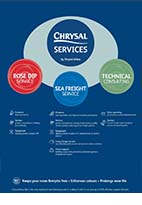 With nearly 40% of Kenya’s direct exports to the UK currently benefitting from significant margins of tariff preferences, concerns have arisen around the UK’s current MFN tariff review and the future basis for Kenya’s continued duty-free access to the UK market after 1st January 2021. In addition, there are growing concerns about the future commercial viability of the use of triangular supply chains for the delivery of Kenyan short shelf life products to the UK market if no comprehensive EU/UK trade agreement is in place by 1st January 2021. Any future EU/UK trade agreement would need, as far as possible, to replicate the current frictionless trade, on which the operation of these triangular supply chains depends. This is looking increasingly unlikely. The Government of Kenya thus faces a triple challenge in ensuring a continuation of current patterns of exports to the UK market into 2021.
With nearly 40% of Kenya’s direct exports to the UK currently benefitting from significant margins of tariff preferences, concerns have arisen around the UK’s current MFN tariff review and the future basis for Kenya’s continued duty-free access to the UK market after 1st January 2021. In addition, there are growing concerns about the future commercial viability of the use of triangular supply chains for the delivery of Kenyan short shelf life products to the UK market if no comprehensive EU/UK trade agreement is in place by 1st January 2021. Any future EU/UK trade agreement would need, as far as possible, to replicate the current frictionless trade, on which the operation of these triangular supply chains depends. This is looking increasingly unlikely. The Government of Kenya thus faces a triple challenge in ensuring a continuation of current patterns of exports to the UK market into 2021.
The MFN Tariff
 Issue Kenyan exporters, through FPEAK, have sought to engage with the UK on-line MFN review consultation process, with the aim of making known Kenyan concerns. The Kenyan government is also understood to have made direct representations to the UK government in regard to their concerns around the MFN tariff review. Until the UK governments’ future MFN tariff schedule is announced, the Government of Kenya, in cooperation with other concerned ACP exporters, will need to continuously reiterate their concerns over the UK’s future MFN tariff policy.
Issue Kenyan exporters, through FPEAK, have sought to engage with the UK on-line MFN review consultation process, with the aim of making known Kenyan concerns. The Kenyan government is also understood to have made direct representations to the UK government in regard to their concerns around the MFN tariff review. Until the UK governments’ future MFN tariff schedule is announced, the Government of Kenya, in cooperation with other concerned ACP exporters, will need to continuously reiterate their concerns over the UK’s future MFN tariff policy.
Given the level of concerns expressed to date, less dramatic changes to UK MFN tariffs than proposed in October 2019 would appear likely. This should bring some relief to those officials in the UK government tasked with negotiating new ‘UK-only’ trade agreements, since in the highly protected agri-food product sector the UK will have held on to a range of important bargaining chips (high MFN tariffs) for use in bilateral trade negotiations with countries such as India.
However, the situation remains uncertain and hence individual Kenya exporters will need to review their vulnerability to the increased competition which could arise from the removal of current UK MFN tariffs. This may require market repositioning strategies on the UK market or export diversification strategies to focus more on EU27 markets, where high margins of tariff preference over MFN suppliers will continue to be enjoyed.
Kenya’s Future Duty-Frees Access to the UK Market
In regard to the future basis for Kenya’s continued duty free-quota free access to the UK market, it should be noted Kenya is the only East African Customs Union member vulnerable to loss of such preferential access. All other EAC members are classified as least developed countries, and hence have no need of a Continuity Agreement with the UK (or EPA with the EU) to ensure continued duty-free access to the UK market. In the case of the UK market this continued duty free will be assured through the UK’s parallel scheme in favour of LDCs which was announced as early as June 2017 It is thus only Kenya which would have its trade affected by the absence of Continuity Agreement with the UK. However, concluding a Continuity Agreement with the UK (as with the EU EPA) would drag the least developed country members of the EAC into reciprocal preferential trade arrangements, despite the recognised right of LDCs enshrined in the WTO, to non-reciprocal preferences. This needs to be seen in a context where Kenya accounts for less than 30% of the total population of the East African Customs Union.
 Given the existence of the East African Customs Union, the integrity of which would be fundamentally undermined by Kenya bilaterally signing and applying a reciprocal preferential trade agreement with the UK (or EU), in terms of access to the UK market a case can be made for the UK finding a mechanism to treat the EAC as whole as a least developed region. If this should not prove to be possible, a mechanism should be sought which preserves Kenya’s duty-free access the UK market, without compromising the right of LDC EAC members to non-reciprocal trade preferences.
Given the existence of the East African Customs Union, the integrity of which would be fundamentally undermined by Kenya bilaterally signing and applying a reciprocal preferential trade agreement with the UK (or EU), in terms of access to the UK market a case can be made for the UK finding a mechanism to treat the EAC as whole as a least developed region. If this should not prove to be possible, a mechanism should be sought which preserves Kenya’s duty-free access the UK market, without compromising the right of LDC EAC members to non-reciprocal trade preferences.
One option in this regard would be the adoption of an extended interpretation of the coverage of EBA style preferential arrangements along the lines of an earlier ‘Norway-style EBA+’ arrangement. This added countries to the EBA beneficiary list on the basis that they were lower middle-income countries (LMICs) and had populations under 75 million.
What is clear is that if the rights of EAC LDCs are not to be compromised, then the UK government should not push Kenya into concluding bilaterally a reciprocal preferential trade agreement which would automatically (and without their sovereign consent) bring EAC LDC governments into a reciprocal trading arrangement with the UK. A solution needs to be found which does not force the Government of Kenya into choosing between continued regional market integration in East Africa and its existing trade relationship with the UK.
In this context the UK’s withdrawal of its Transitional Protection Measure proposal simply complicates matters. It serves to intensifying pressure to negotiate a UK only trade arrangement in a context where the UK itself is poorly placed to devote the necessary attention to an issue which could carry profound socio-economic consequences for those individuals and communities in Kenya whose livelihoods are dependent on UK export markets.
In this context reinstating and extending the Transitional Protection Measure tabled in October 2019 would give priority to ensuring additional time is made available to find appropriate solutions to the dilemma faced in East Africa, rather than simple ‘box ticking’ in a context where UK government trade officials are increasingly under pressure to take short cuts in dealing with complex trade policy issues.
In this context it should be noted that to date the Government of Kenya has not begun any tariff phase downs on imports from EU27 member states, with the EU continuing to de facto extend non-reciprocal duty free-quota free access to imports from Kenya. For as long as the Kenyan government continues not to apply agreed tariff reductions no discrimination against UK exports relative to EU27 exporters can emerge.
In this context the UK would do well to mirror the EU’s approach, since no UK interests in trade with Kenya would be affected by the adoption of such an approach. Politically, it would appear important to find a solution to the dilemma faced in East Africa before the Commonwealth Heads of Government Meeting (CHOGM) in Kigali at which trade will be one of the five themes under discussion.
Such an early announcement can be seen as essential to averting any disruption of Kenya-UK commercial relations in those products where current tariff preferences are most significant. The hard reality is that uncertainty over the future of Kenya’s duty-free access to the UK market from 1st January 2021 could begin to have real commercial consequences from as early as the second half of 2020, as negotiations get underway for the supply of horticulture and floriculture products to the UK market for 2021. This could generate a downward pressure on prices offered for Kenyan products as UK importers seek to hedge against a possible loss of duty-free access to the UK market.
Triangular Supply Chain Issues
In terms of triangular supply chains, individual Kenyan exporters will need to review their exposure to disruptions along such trade routes to the UK market. Where a high degree of exposure is determined to exist, it may be necessary for Kenyan exporters to explore new direct routes to serving UK markets. Initiatives have already been taken in this regard, with the initiation of direct cargo flights from Nairobi to Doncaster/Sheffield airport in the north of England, as early as June 2017
However, the last recorded flight along this route (which at its peak handled 11 flights per month), was in on the 6th August 2019, suggesting there are some operational problems faced in re-directing cargoes directly to the UK, while existing routes via ports of landing in EU27 member states continue to operate without interruption. Nevertheless, this illustrates the potential for the development of new direct routes to the UK in the event of disruptions of triangular supply chains, provided of course other key services can be assured (e.g. SPS clearance on landing).
 At the policy level the Government of Kenya could potentially play a leading role in initiating a political dialogue with the UK and EU authorities on the need for a clear political commitment to taking all necessary measures to ensure the continued smooth functioning of triangular supply chains serving the UK market via initial ports of landing in EU27 member states. Such a Kenyan government led initiative would be likely to garner support from a wide cross section of ACP countries, whose exporters would be similarly adversely affected by any disruption of current triangular shipment routes. However, in addition to this political dialogue there will need to be a parallel dialogue on the practical logistical and border clearance measures which will need to be put in place to facilitate the continued smooth flow of goods along these triangular supply chains. For short shelf life fruit, vegetable and cut flowers, COLEACP could potentially play a role in coordinating such a technical dialogue process (if the resources are made available). However other bodies will also need to get involved given the specific complications which will arise along other triangular supply chains (e.g. for Caribbean rum exports, where bulk rum is exported to EU27 countries before bottling and re-export to the UK).
At the policy level the Government of Kenya could potentially play a leading role in initiating a political dialogue with the UK and EU authorities on the need for a clear political commitment to taking all necessary measures to ensure the continued smooth functioning of triangular supply chains serving the UK market via initial ports of landing in EU27 member states. Such a Kenyan government led initiative would be likely to garner support from a wide cross section of ACP countries, whose exporters would be similarly adversely affected by any disruption of current triangular shipment routes. However, in addition to this political dialogue there will need to be a parallel dialogue on the practical logistical and border clearance measures which will need to be put in place to facilitate the continued smooth flow of goods along these triangular supply chains. For short shelf life fruit, vegetable and cut flowers, COLEACP could potentially play a role in coordinating such a technical dialogue process (if the resources are made available). However other bodies will also need to get involved given the specific complications which will arise along other triangular supply chains (e.g. for Caribbean rum exports, where bulk rum is exported to EU27 countries before bottling and re-export to the UK).
What is clear is that such initiatives are needed if the existing ACP trade to the UK along triangular supply chains is not to be seriously undermined.


